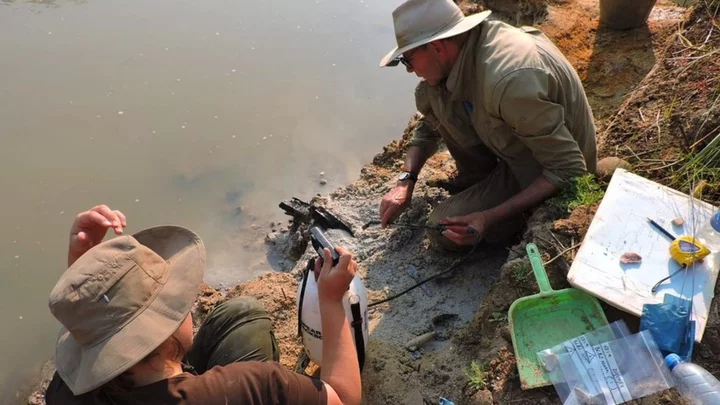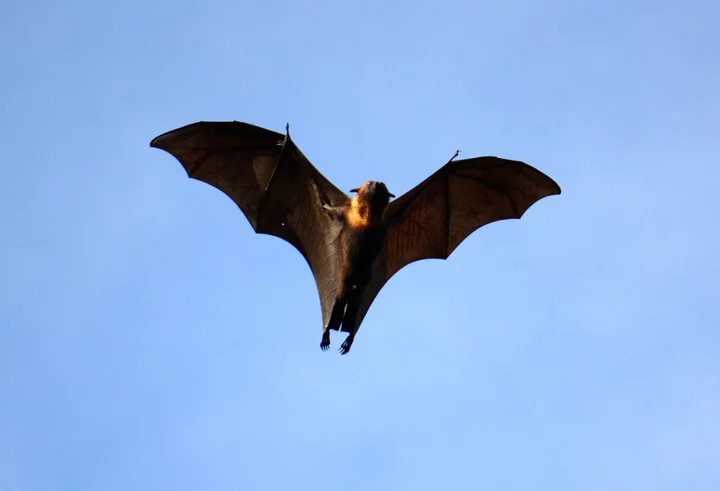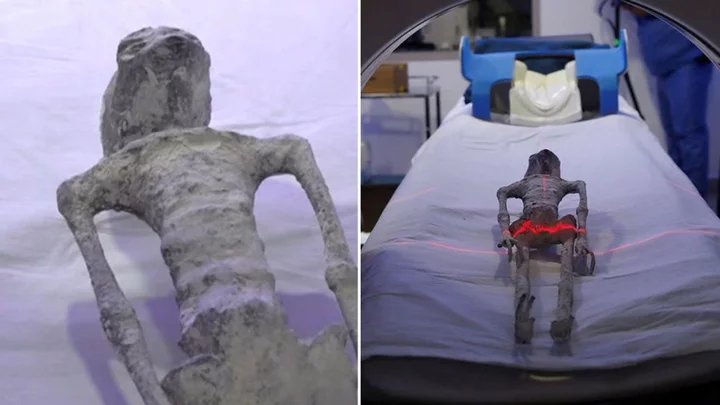
King's France visit mixes PR, politics and security
The royal state visit is intended to reinvigorate the relationship between France and Britain.
2023-09-21 04:16

EU demands answers about Poland visa scandal
The Polish government is embroiled in allegations that migrants were illegally sold visas.
2023-09-21 01:57

Half-million-year-old wooden structure unearthed
Ancient timber preserved in a riverbed suggests humans were building wooden structures 500,000 years ago.
2023-09-20 23:28

Attorney for Alabama band director arrested after football game says tasing was unacceptable and left students traumatized
The Alabama band director who was arrested after refusing to stop his band's performance at a high school football game is grappling with the aftermath of being tased by police, which his attorney says was unacceptable and left students traumatized.
2023-09-20 22:48

Could bats hold the secret to beating Covid and cancer?
Bats could hold the key to unlocking new ways to combat cancer, a new study suggests. A paper published by Oxford University Press, looks at the rapid evolution of bats for their abilities to both host and survive infections such as Covid-19 as well as cancer. The animals are known to have a strong immune system which helps fight off many viruses and diseases. These mammals are also thought to have played a role in the emergence of Covid-19 and scientists say such characteristics are interesting to investigate due to the implications it might have on human health. According to the research, understanding the mechanisms of the bat’s immune system that allows these animals to fight off viral infections – may pave the way to understanding how to prevent disease outbreaks from animals to people. To conduct the study, researchers sequenced the genomes of two bat species - the Jamaican fruit bat and the Mesoamerican mustached bat. The team used advanced technology from Oxford Nanopore Technologies and bat samples collected by the American Museum of Natural History in Belize. They then compared the bat genomes to those of other mammals. The results revealed that bats possessed genetic adaptations in proteins which are related to DNA repair and cancer suppression. It was found that bats had adaptations in six DNA repair-related proteins and 46 cancer-related proteins. The study also found that bats had more than double the number of altered cancer-related genes compared to other mammals, which provided further evidence that they have the ability to suppress cancer. “By generating these new bat genomes and comparing them to other mammals we continue to find extraordinary new adaptations in antiviral and anticancer genes,” said the paper’s lead author, Armin Scheben. “These investigations are the first step towards translating research on the unique biology of bats into insights relevant to understanding and treating ageing and diseases, such as cancer, in humans.” The results open up new paths for understanding and studying the links between cancer and immunity, which offers hope that these insights from bats might possibly lead to new treatments for human illnesses. According to the United States Department of the Interior, there are over 1,400 species of bats worldwide and are mostly found in extreme deserts and polar regions. In the US and Canada, there are about 45 species of bats. Read More British bats ‘can help identify coronaviruses with potential to infect humans’ Coronavirus origins still a mystery 3 years into pandemic Groundbreaking migraine treatment offers ‘new hope’ for patients World Sepsis Day: What is the condition and its symptoms? Duran Duran’s Andy Taylor says he’s ‘asymptomatic’ after end-of-life diagnosis
2023-09-20 22:26

Merrick Garland expected to forcefully rebuke congressional Republicans at Wednesday hearing
Attorney General Merrick Garland is expected to forcefully rebuke congressional Republicans who have accused the Justice Department of political bias, according to excerpts of his prepared testimony to be delivered at a House Judiciary Committee hearing Wednesday.
2023-09-20 20:22

Nagorno-Karabakh: Conflict between Azerbaijan and Armenians explained
The region is at the heart of a long-running conflict between ethnic Armenians and Azerbaijanis.
2023-09-20 19:55

Rwanda's President Paul Kagame confirms fourth-term bid
President Paul Kagame, who has been in office since 2000, has faced criticism from rights groups.
2023-09-20 19:46

US attorney general to tell House Republicans: 'I am not Congress's prosecutor'
By Sarah N. Lynch WASHINGTON U.S. Attorney General Merrick Garland plans to tell a Republican-controlled U.S. House of
2023-09-20 17:17

Six Palestinians killed by Israeli forces in West Bank and Gaza
Israeli forces killed five men during raids in Jenin and Jericho, while one died at a protest in Gaza.
2023-09-20 16:58

Beijing demands Hong Kong consulates hand over local staff data
Details including identity card numbers must be submitted within a month, authorities say.
2023-09-20 16:20

Scientists confirm that one of Mexican aliens is 'alive' after controversial research
Scientists in Mexico have given their verdict on the supposed 'aliens' that were presented to the country's congress last week. Much controversy existed around the aliens who were presented by a man named Jaime Maussan who has previously been accused of using the mummified beings, apparently found in Peru, as part of an elaborate hoax. Despite spawning dozens of memes, the aliens are apparently being treated seriously enough that they have now been studied by scientists who have said that the figures are ‘single skeletons’ and also have 'eggs' inside of them. The two aliens have been named Clara and Mauricio and have reportedly been studied in a lab at the Noor Clinic in Mexico. Lead researcher Dr Jose de Jesus Zalce Benitez, a former navy forensics doctor, who added that as well as being "a single skeleton" the aliens are also a "complete organic being." He also denied that the aliens were part of a hoax and even said that Clara was "alive, was intact, was biological and was in gestation." However, much like the alien bodies themselves, the research has been clouded in controversy and scepticism as the research has yet to be officially verified, with Nasa scientist Dr David Spergel questioning why the findings haven't been made public, as per the BBC. Spergel said: "He said: "If you have something strange, make samples available to the world scientific community and we'll see what's there." Benitez did add in his address at the press conference: "We are facing the paradigm of describing a new species or given the opportunity to accept that there has been contact with other beings, non-humans, that were drawn and marked in the past by diverse cultures throughout the world." Sign up for our free Indy100 weekly newsletter Have your say in our news democracy. Click the upvote icon at the top of the page to help raise this article through the indy100 rankings.
2023-09-20 16:18
